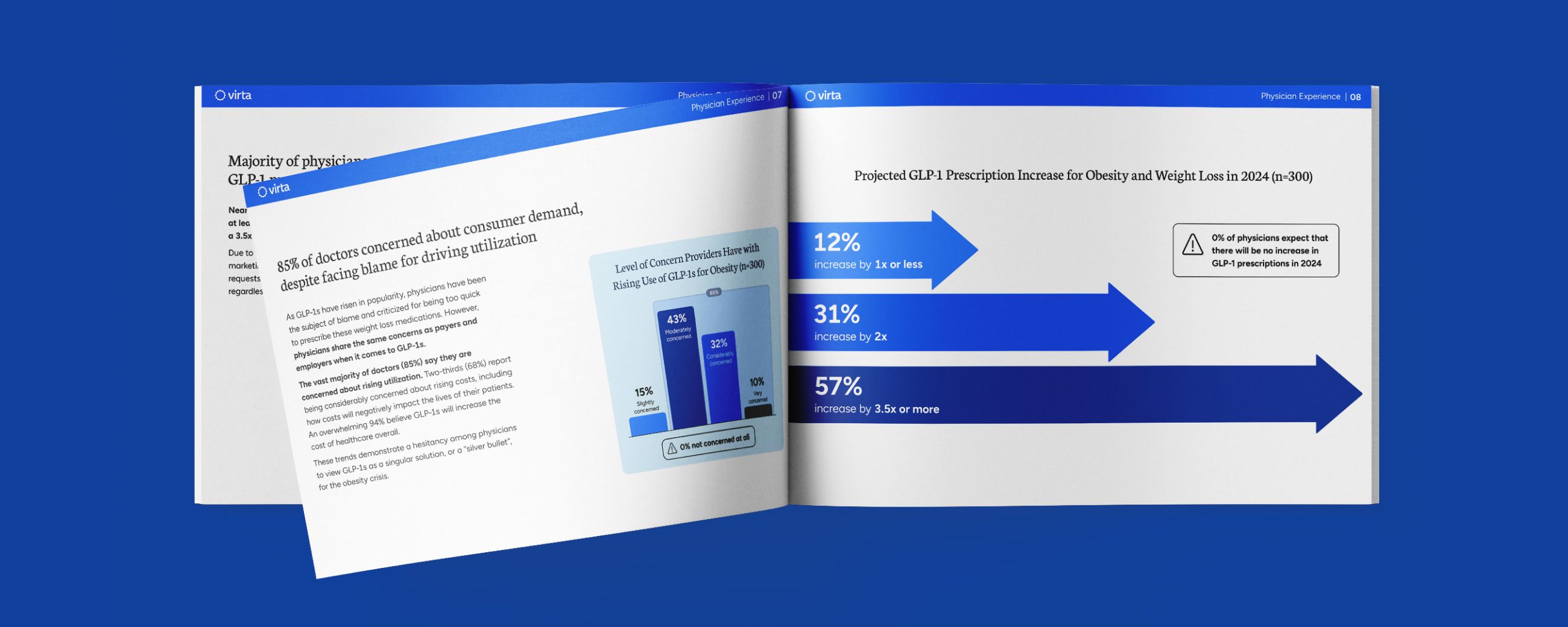.jpg)
Virta’s Approach Improves Kidney Function, Offering Hope to Patients With Chronic Kidney Disease

Chronic kidney disease (CKD) is one of the most common complications of type 2 diabetes. Up to 40% of those with diabetes will develop CKD, which can lead to dialysis or even kidney transplant at later stages.
Yet Virta’s latest research—presented at last weekend’s American Diabetes Association’s 83rd Scientific Sessions—offers hope to people with CKD.
Typically, kidney function worsens over time for people with diabetes, sometimes even faster for those with CKD. But in Virta’s clinical trial, kidney function actually improved at two years for patients on Virta, including those with CKD. Further, the more patients sustained nutritional ketosis, the more their kidney function and its rate of change improved (as measured by eGFR, a key marker of kidney function). In contrast, those in the usual care group follow the traditional trajectory—a decline in kidney function over two years.
We are super excited about this research, as it demonstrates the potential for nutrition and lifestyle change to slow—or even possibly reverse—the progression of chronic kidney disease. These findings also directly disprove the commonly-held belief that a low-carb or ketogenic diet is harmful for those with early-stage CKD, by showing that this approach maintains and even improves kidney function.
Virta’s Chief Medical Officer, Dr. Adam Wolfberg, and Senior Director of Research & Innovation, Dr. Amy McKenzie share more details on this research, why it matters, and what it means for the future of CKD research and care in this 1:1 conversation.
Watch the full interview here (transcription below):
Dr. Adam Wolfberg
Hello, I'm Dr. Adam Wolfberg. I'm the Chief Medical Officer at Virta, and I'm here today with Dr. Amy McKenzie, who is our Head of Research and Innovation. We are just wrapping up the Scientific Sessions at the American Diabetes Association meeting, where Virta had four abstracts presented. For today's discussion, I'd love to focus on the abstracts that were specific to the Virta program and kidney function in the context of kidney disease. Just to start at the basics, maybe talk a little bit about the relationship between diabetes and kidney function and kidney disease.
Dr. Amy McKenzie
Of course. You've probably heard of complications of diabetes, or we've all heard of complications of diabetes that someone can get, and kidney disease is one of those complications. And diabetes itself is the number one cause of kidney disease. If we think about all the people in the world with diabetes, about one out of every three people with diabetes also has kidney disease. So it's very common in the people that we treat. And then one might also wonder, how does diabetes cause kidney disease? What's that relationship? And we know that diabetes is a condition of high blood sugar, and when blood sugar is really high, it can damage the blood vessels that are in our kidneys. And people with diabetes also tend to sometimes have high blood pressure, and that can also damage these blood vessels in the kidney.
Now, I've talked a lot about blood vessels in the kidney. Why are they so important and why do they matter? Their job within the kidney is to help filter out all of the garbage from our blood. So our blood goes into the kidney, the blood vessels are there to help pull all of the garbage out, along with any extra water that we don't need so that we can make urine and get the waste that we don't need out of our body and out of our blood. And the kidney's doing this by passing the water and the waste through the blood vessels. So if the blood vessels are damaged, and they're not filtering and exchanging everything as well as they need to, that's when kidney disease develops. And the other thing that happens is that kidney disease develops really slowly over time. We don't really feel kidney disease happening, so most don't have any symptoms and until the very late stages of the disease as well.
Dr. Adam Wolfberg
And what is the prognosis? And you mentioned late stages, how does that progress in the context of diabetes?
Dr. Amy McKenzie
Sure. Kidney disease is very closely related to heart disease and to diabetes, and we tend to think about them all together. And the therapies that we use are generally aimed around blood sugar lowering, blood pressure lowering, and maintaining a healthy weight. So if all of these things can be maintained and kept in healthy ranges, then the prognosis for kidney disease can be very good. But if we're not so good at that and we let blood sugar run high or let blood pressure run high, or sit at a much higher weight for a long period of time, that's when kidney disease tends to develop and it can tend to worsen more quickly. Our goal in terms of giving people a better prognosis is to make all of these things better, and that will help them get their kidney function back to normal or to at least prevent it from declining at a very fast rate.
Dr. Adam Wolfberg
Let's get to the punchline. What did the Virta research show in terms of the impact of the Virta program on kidney function?
Dr. Amy McKenzie
Let's start with how we measure kidney function. One way to do that is by something called eGFR slope, it's the estimated glomerular filtration rate, and it's the slope of its change over time. Essentially, the rate of change in one's kidney function over time. And what we found was that kidney function, measured by eGFR slope, improved over two years for people with diabetes who selected to work with Virta to care for their diabetes with a very low-carb diet, and through our continuous remote care platform and our clinical team. But when we looked at the usual care group that we also had in the trial, those who were in that group, their kidney function worsened over time. And remember earlier I said about a third of people with diabetes have chronic kidney disease? The rate in our trial was actually even higher, over 40% had some degree of kidney disease. And we found that kidney function also improved for the people with type two diabetes and chronic kidney disease in the early stages.
At Virta, what we are utilizing is a very low carbohydrate diet. The low carbohydrate diet helps people lower blood sugar, lower their weight, lower their blood pressure. And one way that we can tell if people are following the dietary advice is by checking ketones. It's a finger stick test, just like blood glucose that everyone is familiar with. And we can look at the ketones and tell whether or not someone is adhering to this low carbohydrate dietary intake advice. And through these tests that we have to help guide our patients, we were able to see that there's a dose dependent relationship between nutritional ketosis and improvement in kidney function. What that means is that people who sustained nutritional ketosis sustained eating a low carbohydrate eating pattern the most over these two years, they had the greatest improvements in kidney function even in the early stages of kidney disease.
Now, through all of this we have a much better understanding of how very low carbohydrate nutrition therapy can impact kidney function. We know that it can improve it. And we also know how we can best educate and advise our patients on how to protect their kidneys and keep them functioning well, and also how to improve the kidney function if chronic kidney disease has already developed.
Dr. Adam Wolfberg
Let's talk about the big picture for a second. You've described, I think what we all know, is that there's an epidemic of type two diabetes in the United States, and a third of those patients have kidney disease as a likely consequence of their diabetes. How do you think that this science that the teams presented informs the management of diabetes and the treatment of kidney disease in the context of diabetes?
Dr. Amy McKenzie
Sure. So big picture, we don't want anyone with diabetes to develop end stage kidney disease. We just don't. This is when someone's kidneys are failing and they need a transplant, or they need to go on dialysis several times per week for several hours at a time. It is an incredibly big burden on one's health and one's life, and no one deserves that. So we want to prevent that from happening. And here, with this research, we have some evidence that kidney function can actually get better in people who work with Virta and use a very low carbohydrate diet and nutritional ketosis to improve not only diabetes, but also their kidney function. So big picture, we're giving people options, treatment options to help them live a better life than what they were currently dealing with.
Dr. Adam Wolfberg
Now, my understanding, Amy, is that to a certain extent this research flies in the face of what we had generally thought about the impact of a very low carbohydrate diet on kidney function. Can you talk a little bit about whether the science existed previously and this contradicts prior science, or whether it was just dogma and these are new data that help us to think about treating kidney disease more effectively going forward?
Dr. Amy McKenzie
Sure. There are nutrition recommendations for people with chronic kidney disease, and they have some specific recommendations about how much protein someone should be eating and how much salt someone should be eating. And those recommendations don't necessarily align perfectly with best practice for implementing a well formulated ketogenic diet. And because of this, some people think that the two can't coexist. If it doesn't align with the dietary recommendations that we have for people with CKD, then we clearly can't use it, it's going to be detrimental.
Also, sometimes people think that low-carb has to be high protein, and that's also not the case. If a low carbohydrate diet is ketogenic, it can't be a high protein diet, or we wouldn't be able to see ketones. And because of all of these factors, some people then assume that a low-carb or a ketogenic diet might negatively impact kidney function. So people generally have some concern around using it in kidney disease, and they think it shouldn't be used. But what we see here in the data now is that, at least in the early stages, that's really not the case. People with early stages of kidney disease are eating a ketogenic diet and improving their kidney function.
Dr. Adam Wolfberg
Amazing. I love our process of evidence generation and the way it informs medicine. But speaking of that, research is an iterative process, we build on well-designed trials that have been done previously. So what's next? What's the next study to be done that will advance this very exciting research that you've just described?
Dr. Amy McKenzie
Absolutely. Well, I hope that this research shows that people with early stage kidney disease can safely eat a very low-carb ketogenic diet, and not only maintain, but also improve their kidney function. I hope that starts to disseminate out into clinical practice. But in the medical field we like to have really good evidence, because we care about our patients and want to put the best evidence forward. So when I think about this in terms of chronic kidney disease, what we're utilizing in our studies are markers of kidney function. They're surrogates or they're proxies for these end stage major events like kidney failure or needing to go on dialysis.
I think as a medical field what we want to know is the impact of all the different therapies that we have on these hard endpoints like needing dialysis or needing a kidney transplant. So what I would love to see in the future, for not only our research, but for everyone's when it comes to nutrition therapies and various care models that we have for type two and chronic kidney disease is, I'd love to see the comparative effectiveness of all these different therapies and models on these major events down the line. And I think that's what's really going to move the field forward.
Dr. Adam Wolfberg
Thanks. Amy, your team has done incredible work, so congratulations.
###
This blog is intended for informational purposes only and is not meant to be a substitute for professional medical advice, diagnosis, or treatment. Always seek the advice of your physician or other qualified health provider with any questions you may have regarding a medical condition or any advice relating to your health. View full disclaimer
Are you living with type 2 diabetes, prediabetes, or unwanted weight?








